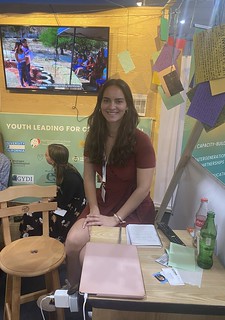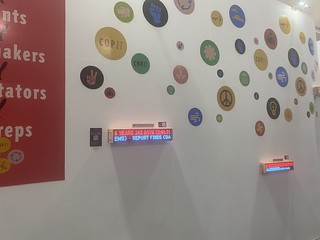I can’t pinpoint the first time I ever learned about climate change. I don’t recall it being mentioned in my education before senior year of high school and it didn’t seem to show up in my early exposure to pop culture. But I can pinpoint the many times I have heard generations before mine apologize for leaving us with the climate crisis. The week before leaving for Egypt, I overheard a teammate remark on how they “think climate change is a conspiracy theory”. I was taken back by such a statement, but also took it as a moment to check my reality. While I hoped at least all young people would see the severity of the climate crisis, my teammate reminded me that this is not the case.
As a young student at COP27, I felt a great heaviness being a part of “the generation that will solve climate change” (or at least that’s what every other generation seems to be saying). Such a responsibility brings with it a lot of pressure. In the 27 sessions of COP, this year was the fi rst time there has ever been a youth pavilion. That is about a whole generation’s worth of time, just to include a youth pavilion. But such a phenomenon shows us that it takes a whole generation’s worth of time to get new perspectives in the conversation. I wondered how this process could be sped up. One of the most frustrating positions to be in at COP was the position of the observer. Some negotiations filled up too fast or were closed to observers all together. I physically could not be in the room that was making choices about my future well-being and that of my children and my grandchildren.
On the other hand I did get to hear about many amazing ways youth were being involved locally. Leslie Shultz – a member of the Ngadju Community in Australia – highlighted their Indigenous Rangers Program. There they train people to care for the Great Western Woodlands and the Nullarbor plains. Shultz especially emphasized how they focus on bringing in youth to this program so they may sustain these efforts in the future. Similarly a representative from the Zimbabwe Farmers Union presented on their efforts to create a new school curriculum on sustainable land use. This led me to reflect on my early school curriculums and realize, they hardly included lessons on climate change, environmental injustice, indigenous perspectives and a variety of other crucial topics that relate to the climate crisis.
 After my initial frustrations about not being able to contribute to international agreements, I realized change does not have to come about in such extravagant gestures. While the COP was a place for parties to meet internationally, it was also a place to share smaller successes that can be duplicated throughout local communities. I witnessed how youth were being involved in various spheres which made the problem of climate change not seem so daunting. Throughout my time at UConn I have been so focused on policy as the way to solve the climate crisis. What COP has put into perspective for me is that policy may be written and implemented by policy makers, but it is the attitude of the people that shape it. One way to shift such attitudes and accelerate the inclusion of new perspectives is through youth involvement and education. When kids can grow up learning about, experiencing and understanding our planet there is greater room for change. I always told myself I wouldn’t go into education. But I have since seen how influential my role in educating generations even beyond mine could be. Climate change is a crisis that my generation has inherited from generations before mine that did not deal with it. It is inevitable that the generations that come after mine will inherit the crisis however we choose to deal with it (or not). Climate change most likely won’t be solved in the next 30 years and even if it is, the Earth needs time to heal. One thing I hope I can do is leave the next generation with the adequate tools to continue on the work my peers and I are doing today. While this isn’t a path for myself that I have explored indepth, my time at COP has contributed to this new avenue.
After my initial frustrations about not being able to contribute to international agreements, I realized change does not have to come about in such extravagant gestures. While the COP was a place for parties to meet internationally, it was also a place to share smaller successes that can be duplicated throughout local communities. I witnessed how youth were being involved in various spheres which made the problem of climate change not seem so daunting. Throughout my time at UConn I have been so focused on policy as the way to solve the climate crisis. What COP has put into perspective for me is that policy may be written and implemented by policy makers, but it is the attitude of the people that shape it. One way to shift such attitudes and accelerate the inclusion of new perspectives is through youth involvement and education. When kids can grow up learning about, experiencing and understanding our planet there is greater room for change. I always told myself I wouldn’t go into education. But I have since seen how influential my role in educating generations even beyond mine could be. Climate change is a crisis that my generation has inherited from generations before mine that did not deal with it. It is inevitable that the generations that come after mine will inherit the crisis however we choose to deal with it (or not). Climate change most likely won’t be solved in the next 30 years and even if it is, the Earth needs time to heal. One thing I hope I can do is leave the next generation with the adequate tools to continue on the work my peers and I are doing today. While this isn’t a path for myself that I have explored indepth, my time at COP has contributed to this new avenue.